Freshman Chris Noe was diagnosed with leukemia in May 2019. He is now one year cancer free and playing baseball for the school. Chris said that throughout treatment, he never gave up on his goal of returning to the field.
Back on the pitcher’s mound
Baseball motivates freshman through leukemia treatment
December 17, 2020
Editor’s note: This story was included in the portfolio that was named superior in the 2021 TAJE Best of Texas contest. It was also named a superior sports feature story. It won for sports features in the Dallas Morning News high school journalism contest. It also won first place for sports stories in the Press Women of Texas high school journalism contest and went on to win first place in the same category in the National Federation of Press Women contest.
When freshman Chris Noe threw a tennis ball down the hospital hallway as an eighth grader, he didn’t think about his leukemia.
In his mind, he was on the pitcher’s mound, glove on one hand, baseball in the other. The beeping machines were cheering fans. The nurse standing across from him was a catcher. Cancer no longer took a toll on his body.
He eventually had to return to his hospital room and continue treatment, but his mind always wandered back to baseball. Because Chris knew that no matter how bad his leukemia got, he would make it back to the field.
Shocking diagnosis
Chris grew up on the pitcher’s mound. His dad played in the minor leagues, so it wasn’t a surprise when Chris picked up a ball at 4 and never looked back. As soon as his little brother was old enough to stand up, Chris taught him how to play.
“My dad was always my coach, so that was fun because I normally got to help him with planning and stuff,” Chris said. “Traveling was fun, especially when you win.”
Baseball became his life. Weekends were spent at tournaments. It became the focus of Chris’ family, but his mother, Jennifer, didn’t mind.
“It seemed like this [was] one of the times that he was just relaxed, having fun, especially as he got older and a little more anxious with life,” Jennifer said. “Just maturing as a kid, he’d always easily make friends with his baseball family.”
It wasn’t until November 2019 that Chris noticed anything wrong. He was going to the bathroom a lot, but they cut dairy out of his diet and passed the symptoms off as lactose intolerance. It worked at first, but by March, Chris was throwing up four or five times a day and losing weight. His body was covered in bruises and he developed a rash on his legs, but he didn’t let anything stop him from playing baseball.
“There were a couple instances where I was pitching and I’d throw up and then go back,” Chris said.
They never thought it was cancer. Jennifer, who used to research pediatric leukemia, was careful to limit Chris’ exposure to cancer-causing chemicals since birth and rationalized his symptoms. Chris was already trying to lose weight. She attributed his nausea to anxiety. The bruises and rash to baseball. She thought of every other possibility, from uneven hormones to puberty, but leukemia never crossed her mind.
It wasn’t until early May that they grew concerned. He came home from pitching one Sunday just like he had done for the past decade, but this time something was off. Chris — the energetic kid who regularly got up for early morning practices — went to bed and didn’t wake up for 18 hours. It wasn’t just teenage laziness or exhaustion from a long day at practice. Although cancer still wasn’t on their radar, it became clear that Chris was sick.
He got blood work done the next day. By 3 p.m. on Tuesday, Jennifer received a phone call telling her to rush to the emergency room. Chris’ blood work suggested cancer. They were shocked.
“Everything just stops,” Jennifer said. “It’s a very frightening thing to hear.”
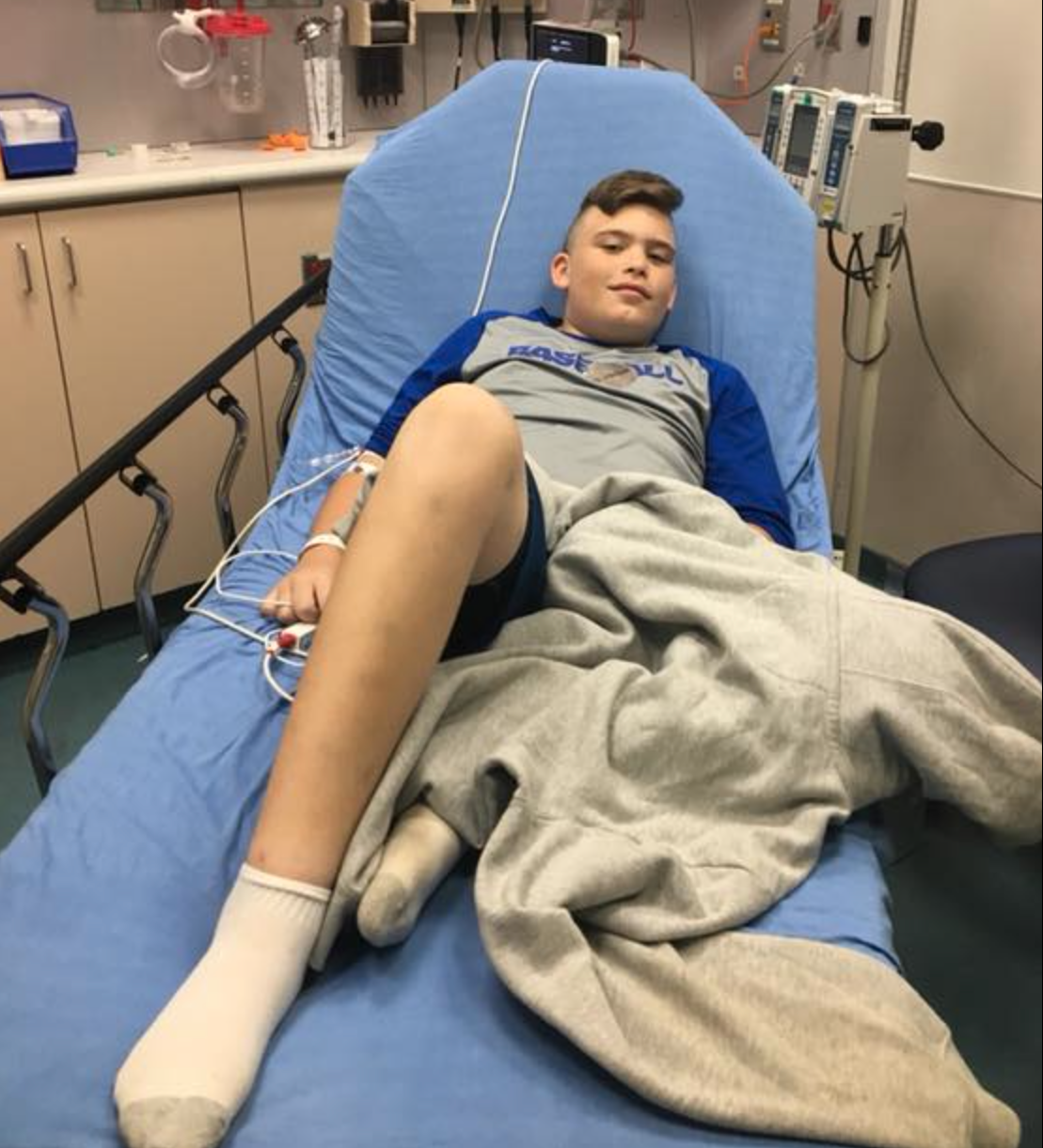
A few hours later, Chris was diagnosed with acute myeloid leukemia, a rare type of cancer that attacks white blood cells.
But Chris saw the situation as many middle school boys would — a promise to skip the upcoming STAAR test.
“Reality still hadn’t hit,” Chris said. “So I really wasn’t upset at first because the thought of not having to go to school was nice. It kind of felt fun.”
But when Chris realized that his diagnosis meant he couldn’t play baseball, dread began to set in. He was worried about missing games and practices before he understood what he would go through. Chris wanted to continue playing baseball beyond high school, but suddenly, even trying out for the team his freshman year was in jeopardy.
“College, pro, just everything above,” Chris said. “Even if I’m not actually playing I want to be some sort of scout or something like that.”
Rounds of chemo
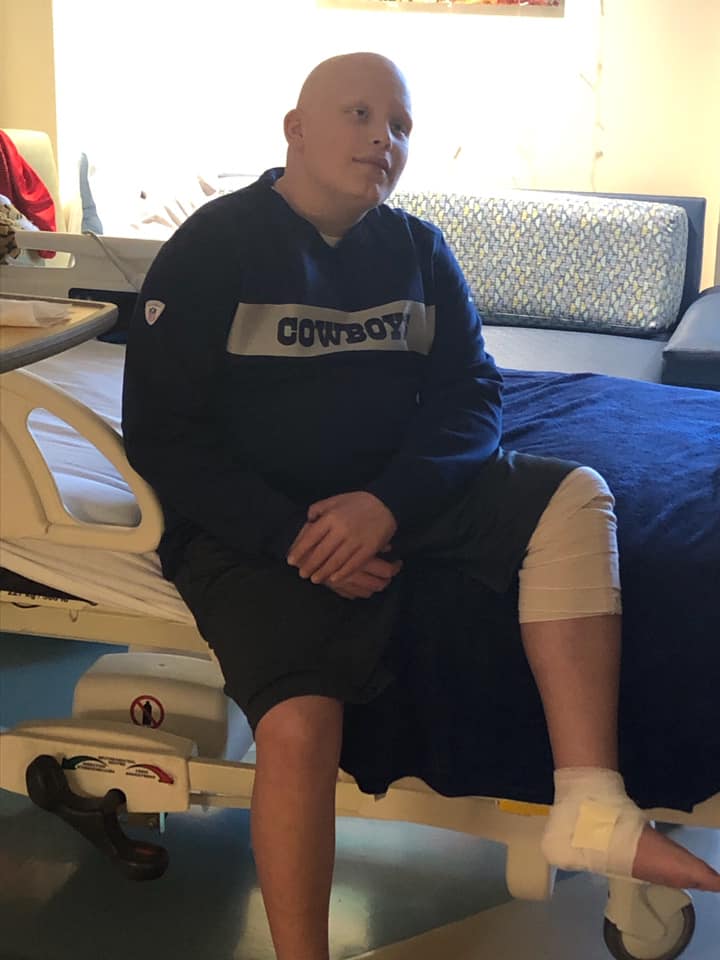
Chris’ treatment proved to be anything but easy. The disease was advanced, so he immediately began his first round of chemotherapy. Since Chris was severely immunocompromised, he couldn’t leave the ultra-filtered air of the hospital’s sixth floor. His family’s whole world was suddenly put on pause and confined to Children’s Medical Center Dallas.
“All the nurses, they became like family, and we would decorate how we wanted and we would joke that it was like our dorm room and they were our dorm mates,” Jennifer said. “But you never expect that you’re going to have two homes when your family is still together.”
On top of dealing with Chris’ diagnosis, his parents had to figure out everything from work to child care and grocery shopping. Jennifer said she felt like a robot, focusing on the seemingly endless tasks that came with having a sick kid.
“Those things just flood your mind,” Jennifer said. “How you’re going to deal with your day-to-day life when you realize that actually your day-to-day life was going to completely stop and change.”
Chris’ first round of chemotherapy left him extremely sick and in the hospital for 42 days. Although Chris doesn’t remember much of it, Jennifer does. His parents switched off staying with him in the hospital, but Jennifer often stayed when he was really sick.
Chris fought through everything from rashes to high fevers. He began losing his hair within his first two weeks in the hospital. It was the first time they realized how sick Chris truly was.
“It’s just hard,” Jennifer said. “We can’t do anything. You just have to sit there and watch and wait.”
There were multiple instances where they worried he might not make it through treatment.
“You get so bonded with your kid, and you never think that that moment would happen where you’re getting close to losing them,” Jennifer said. “It’s just an indescribable, terrifying feeling.”
Although Chris tried to be positive, it was impossible to ignore the fear that came with being sick. He wasn’t sure if he would make it to 14.
“He even told me that he doesn’t think he was supposed to see this birthday,” Jennifer said. “He obviously thought about it too even though he never expressed it.”
However, Chris’ health began to improve as the chemo worked against the cancer in his body. His doctors planned on three more treatments. Each would round last about a month, allowing Chris to go home for five to 10 days in between. They knew that the first round is normally the worst, so they began to feel more confident that Chris would beat leukemia.
• • •
On good days Chris and his mom did everything they could to have fun. They decorated their room and binged watched shows like “The Office.” They learned how to make nachos and smoothies in the hospital.
When he wasn’t doing schoolwork, Chris often hung out at the nurses’ station or rolled around the hallways in a wheelchair with a 3-year-old leukemia patient, who was the same age as his little brother, Harper. Chris treated her like a sibling, getting her candy and playing with her like he did with his brother before he was diagnosed.
His dad and little brother visited almost every night, often pushing tables together in the waiting room to have dinner. If not, they FaceTimed together to read stories and look at the decorations in Chris’ room. His little brother was too young to understand what was going on at the time, so Chris often tried to protect him from the reality of his cancer.
“He thought I was in a hotel at first,” Chris said. “The first night he stayed the night with me, he didn’t have a clue what was going on and so I tried not to let him see that I was actually sick.”
Spending so much time locked in a hospital room with his mom caused tension at times, which Jennifer expected. Chris was a teenager and he wanted to live like one. He wanted to see his friends and go to school. When the mental struggle of battling leukemia was added to feeling sick, nobody could expect Chris to be positive all the time.
“He had to learn how to be a new teenager, going through life changes, and living in the same room with your mom 24/7, because he didn’t always feel bad,” Jennifer said. “He had moments of being completely normal, but he was trapped and he couldn’t do anything about it.”
Although they butted heads sometimes, Chris said that having his mom with him when he was sick was comforting and strengthened their relationship.
“We’re used to being with each other all the time, so it’s kind of weird when we’re not,” Chris said. “It used to be weird going on road trips and stuff, but this season I had a tournament in Houston and we just drove down and talked for six hours. It didn’t bother me.”
• • •
But when Chris felt really sick, baseball was the one thing that could take his mind off of it. He loved to play catch whenever possible. When he didn’t feel well, his nurses talked to him about what it would be like to play again.
“Without that, I don’t know what would have kept him going,” Jennifer said. “That definitely was a major driving force.”
Chris met several professional athletes, but Jennifer said that the most influential players that reached out to Chris during his treatments were members of the varsity baseball team. They sent him a video message and card after hearing he was a baseball fan. Head Baseball Coach Jeffrey Sherman said that he always encourages his players to help people who may be facing difficult situations.
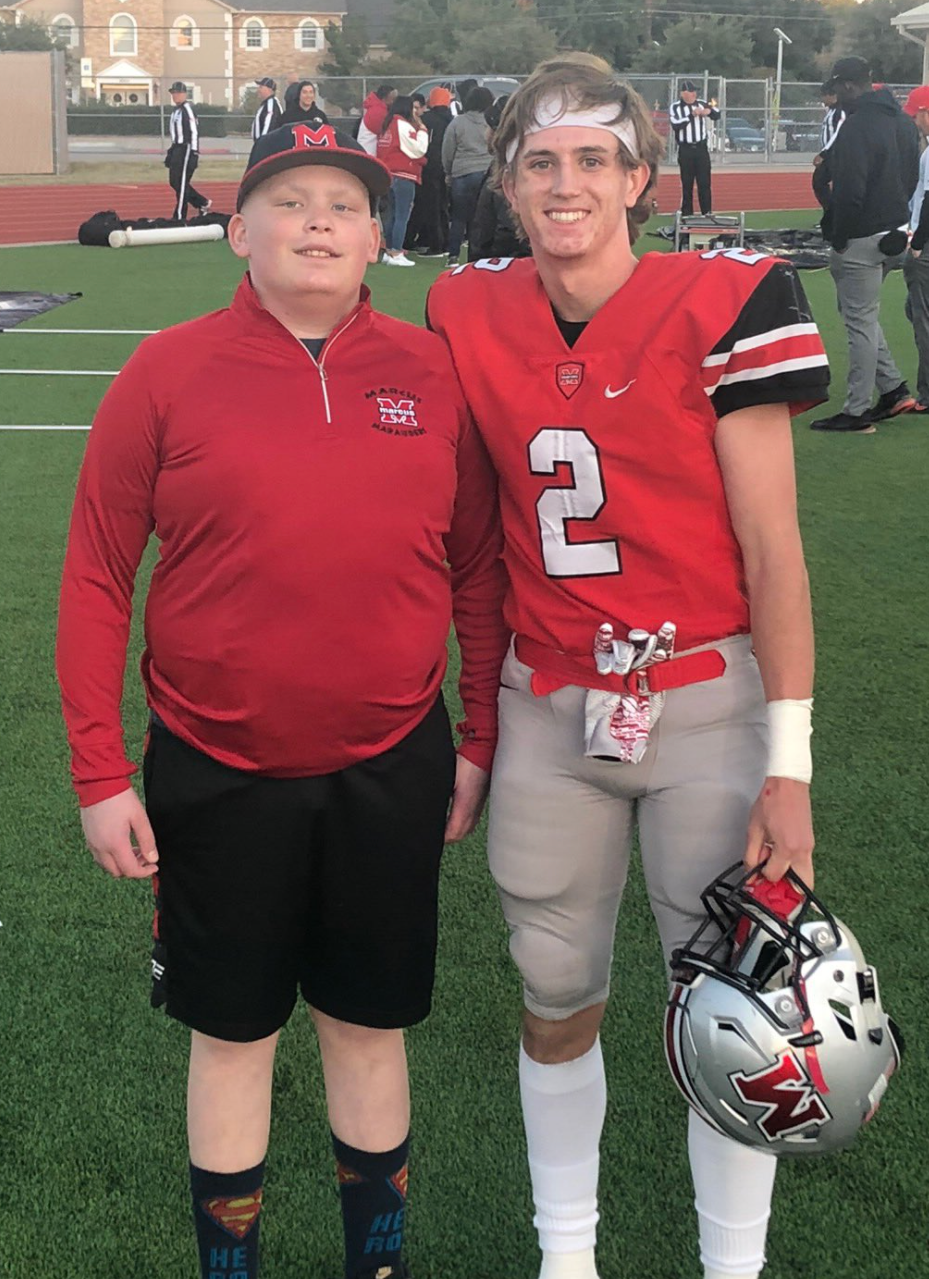
“I wanted a kid that’s around that’s just like us and to try to create some normalcy as he’s going through chemo, the game that he loves, and that our guys to be one inspired by,” Sherman said. “We’ve had some really good baseball teams and a lot of that has to do with people like Chris Noe and learning through his courage and his fight.”
The team has sponsored several kids with different medical conditions in the past, which motivated senior Ty Johnson to get Chris more involved with the team.
“I just wanted to create that for somebody else,” Johnson said. “Create that kind of happiness and give them somewhere where they belong.”
Chris became the team manager and went to every workout and game he could in between treatments. He quickly bonded with the players and encouraged them from the dugout.
“I’d go to some of the 5 a.m. workouts with them in the gym, so it definitely helped me motivate more,” Chris said.
Johnson and the rest of the team were inspired by the eighth grade boy who was determined to play baseball despite his illness.
“Seeing him putting a smile on his face kind of made my day and I’m pretty sure it made everybody else’s day too,” Johnson said.
• • •
But when he reached the end of his fourth round of chemo, which was supposed to be his last, his doctor decided to add one more to be safe. He would have to spend a few more weeks looking outside of his hospital window instead of getting back on the baseball field.
Chris was devastated.
“That brought on a lot of extra anxiety and fears and frustrations because we were actually just celebrating being done with the chemo,” Jennifer said.
During the fifth round of chemo, Chris got an infection. It caused his health to deteriorate quickly. He didn’t want to eat or move. His heart rate and respiration decreased, landing him on the ICU watchlist.
“It was definitely worse than I thought it was going to be,” Chris said. “It felt worse than chemo at some points.”
Return to the roster
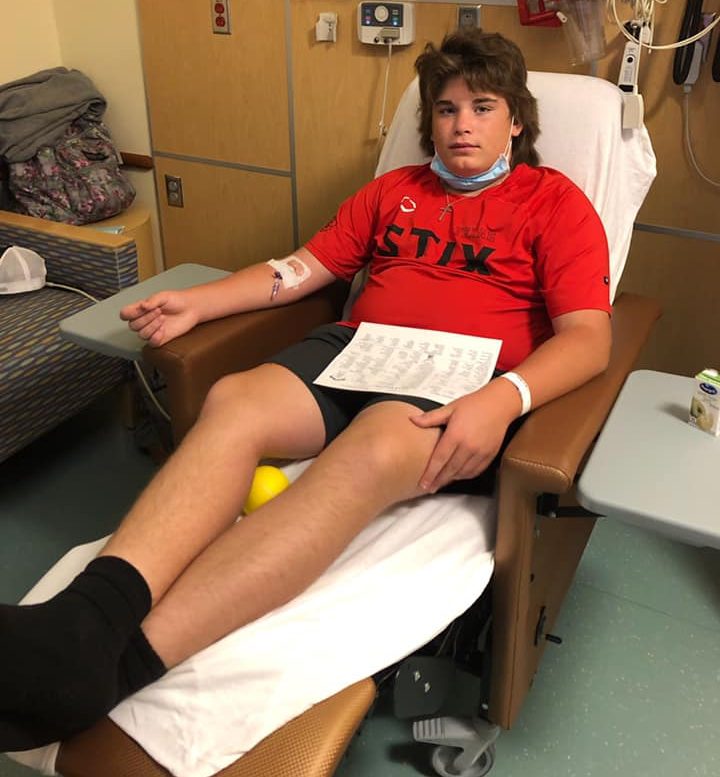
Chris beat the infection, finishing his last round of chemo in December 2019. Although he would still need follow up appointments for a few years, he was in remission. More importantly, he could finally get back to baseball.
“I was still really sick from the infection at the time, so I didn’t really feel much of it, but I knew I was happy,” Chris said.
Chris returned to the pitcher’s mound on Christmas with new cleats he got that morning. But the treatment left him weak and caused pain in his joints.
“It kind of discouraged me at first realizing how bad I was when I came back,” Chris said.
But he refused to give up. Chris knew that if he trusted himself as a player and kept working, he would get stronger. He worked out with his dad and started going to school practices again, even traveling with the team to California for a tournament in February. His first game back was in June.
When getting back into baseball, Chris took charge. He contacted coaches and scheduled tryouts on his own. Jennifer said that it has been amazing to take a step back and watch her son take initiative.
“I was surprised at how fast he could do it and how determined he was,” Jennifer said. “He came back with a lot more determination. A lot of drive and fire in him that we hadn’t seen prior to this.”
Chris officially joined the school’s team as a freshman at the start of this school year. When he is playing baseball now, Chris stands on the pitcher’s mound, not in the hospital hallway. He won’t have to stop playing to go to therapy or take more medication. He now wears a Marauder baseball uniform and his hair is grown out into the team’s signature mullet.
As a coach, Sherman said he was impressed with Chris’ work ethic. Chris said he is excited to start the college recruitment process soon to continue his baseball career.
“It would definitely be motivating,” Chris said. “Amazing. Just kind of unreal to realize I’m still actually playing.”
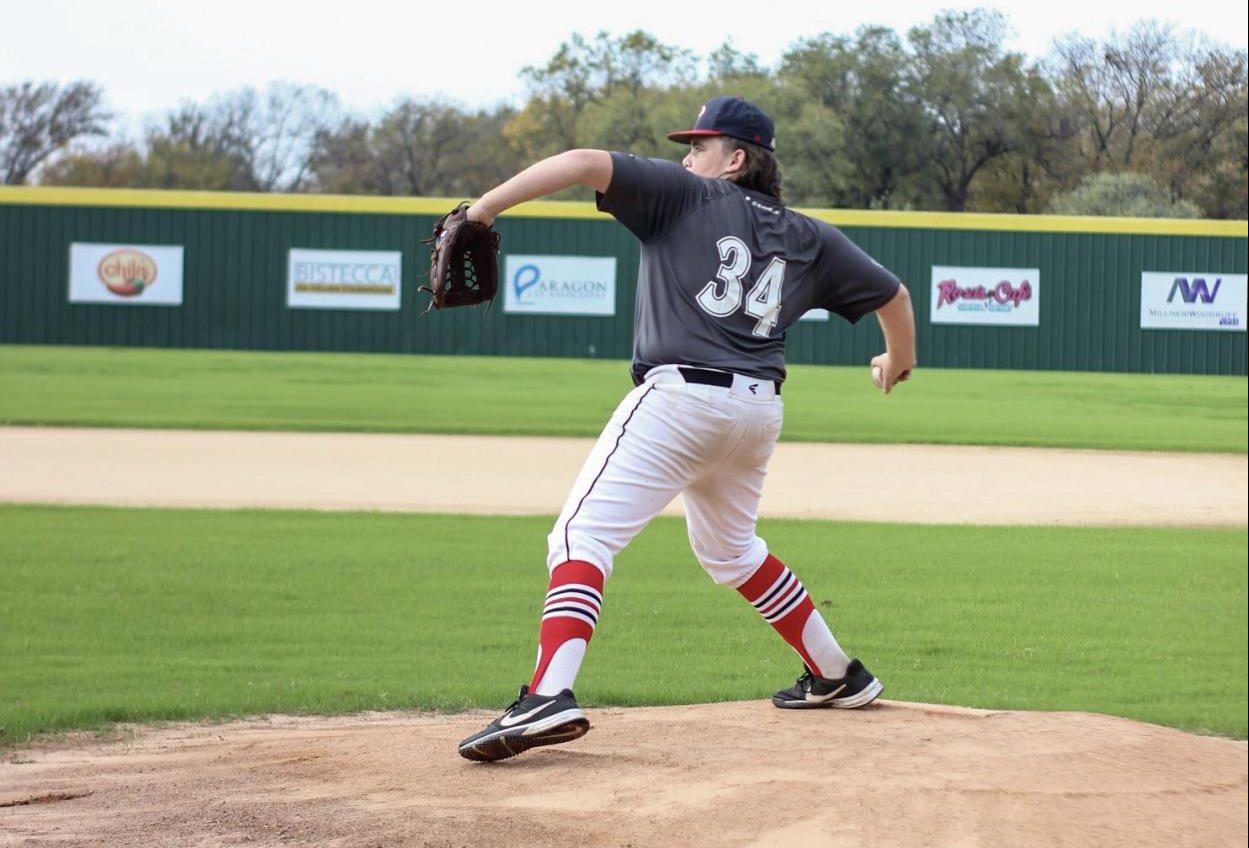
Although his diagnosis and treatment were difficult, Chris said he wouldn’t change what happened, because realizing that his family could have lost him helped Chris find a new appreciation for his parents and brother.
“I’m lucky to have them now because I could have gone away that easily,” Chris said.
Before games, Chris sometimes looks at photos from his battle with cancer and reminds himself of the times during treatment where he could only imagine playing like he is today. He reminds himself that he finally made it back to the baseball field.
“It feels better to play it now, realizing I could have lost it,” Chris said.

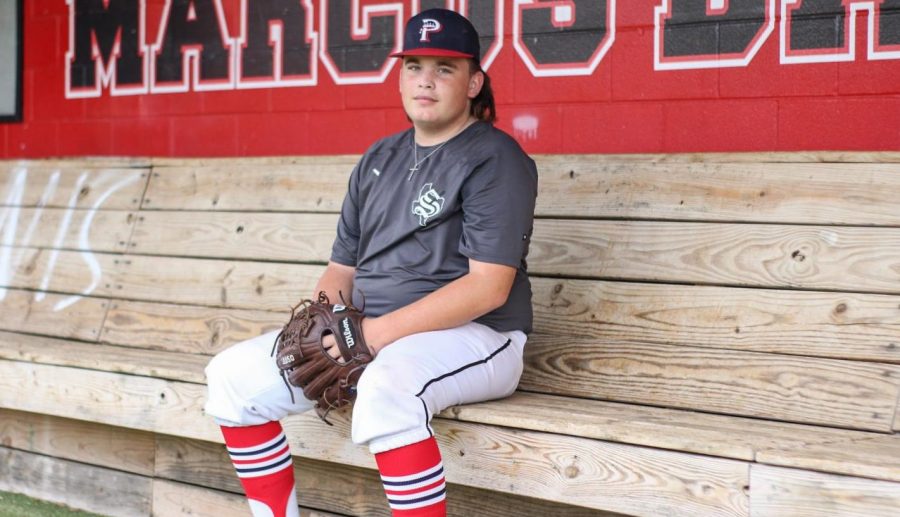
Patty Gross • Dec 19, 2020 at 10:38 AM
I am Coach Sherman’s mother, and could not be more encouraged by Chris’s story. You must be very proud of your son. He has surely shown what it takes to overcome adversity.
I am also proud of the Marcus team and of the true compassion and encouragement they have shown. Coach Sherman knows what it takes to overcome adversity as well. Although nothing as brutal as what Chris went through, I believe that experience has provided him a special place in his heart for kids like Chris. I look forward to seeing much more about his baseball career over the next couple of years. I am also confident that he has the will and stamina to face whatever the future brings. I applaud you, as parents, for your commitment to his treatment and success as well, as I fully understand how that can strain a way of life in ways that are unimaginable.
You and your family are in my prayers for continued recovery and the chance for Chris to have his dreams fulfilled.
Patty Gross